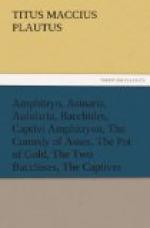that I am a man without a country, a prisoner,
I suppose it is not to be expected that he should
stand more in awe of me than of you. The
chances of war have put master and man on an
equal footing. I remember the time when he did
not venture to offend me by a word: now
he is at liberty to do me an actual injury.
sed viden? fortuna humana fingit artatque ut lubet: me, qui liber fueram servom fecit, e summo infimum; qui imperare insueram, nunc alterius imperio obsequor. et quidem si, proinde ut ipse fui imperator familiae, habeam dominum, non verear ne iniuste aut graviter mi imperet. Hegio, hoc te monitum, nisi forte ipse non vis, voluerim.
But you see! fortune moulds us, pinches us, to suit her whims: here am I, the one-time free man, a slave—tossed from the heights to the depths. Accustomed to command, I am now at another’s beck and call. And indeed, if I might have such a master as I myself was when I was the head of a household, I should have no fear of being treated unjustly or harshly. There is one thing I should like to impress upon you, Hegio,—unless you object, maybe.
Hegio
Loquere audacter.
No, no, speak out.
Tynd.
Tam ego fui ante liber quam gnatus tuos, 310 tam mihi quam illi libertatem hostilis eripuit manus. tam ille apud nos servit, quam ego nunc his apud te servio. est profecto deus, qui quae nos gerimus auditque et videt: is, uti tu me his habueris, proinde illum illic curaverit; bene merenti bene profuerit, male merenti par erit. quam tu filium tuom, tam pater me meus desiderat.
Once I was free as your son; an enemy’s success deprived me of my liberty as he was deprived of his; he is a slave in my country as I am here with you. There surely is a God who hears and sees what we do: and according to your treatment of me here, so will he look after your son there. He will reward the deserving and requite the undeserving. Just as you long for your son, so does my father long for me.
Hegio
Memini ego istuc. sed faterin eadem quae hic fassust mihi?
I know all that—but
do you admit the truth of what this
fellow has told
me?
Tynd.
Ego patri meo esse fateor summas divitias
domi
meque summo genere gnatum. sed te optestor,
Hegio,
ne tuom animum avariorem faxint divitiae
meae: 320
ne patri, tam etsi sum unicus, decere
videatur magis,
me saturum servire apud te sumptu et vestitu
tuo
potius quam illi,
ubi
minime honestumst, mendicantem vivere.[11]
(323)
I do admit that my father is a very wealthy man at home and that I do come of very good family. But, Hegio, I beseech you, don’t let my wealth make your demands too exorbitant: for my father, even though I am his only son, might feel that it was better for me to remain your slave, well fed and clothed at your expense, than to come to beggary there at home where it would disgrace us most.
Hegio




